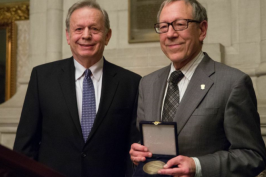 Ottawa, 28 October 2014. Parliament of Canada. Irwin Cotler, receives from Mordechai Paldiel the Raoul Wallenberg Centennial Medal.
Ottawa, 28 October 2014. Parliament of Canada. Irwin Cotler, receives from Mordechai Paldiel the Raoul Wallenberg Centennial Medal.“One of the most profound human rights lessons I was taught came from my daughter-now 25-who, at the age of 15, challenged me as follows: “Daddy, if you want to know what the test of human rights is, always ask yourself at any time, in any situation, in any part of the world, is it good for children? Is what is happening good for children? Daddy, that is what justice is all about”
On the occasion of the 60th anniversary of Raoul Wallenberg’s disappearance, on the eve of the 60th anniversary of the United Nations Charter and the Nuremberg Principles, Irwin Cotler insisted on some truths that are unfortunately disturbing today.
Here are some selections from his speech:
“The plight of war-affected children is clearly one of the most devastating tragedies of our time. The statistics of the millions of children caught up and scarred by the brutality of war and conflict, not only numb the pain; they also obscure the tragedy. We are speaking about children who have lost their parents, their homes, their schools, their neighborhoods-all the components of human security. How we respond to the human security of children will define the integrity of the International humanitarian law revolution.”
If the United Nations Charter and the Nuremberg principles represented a revolution in international law but, despite their importance, mass atrocities continue its expansion and millions of children are still losing their childhood, their dignity and their basic rights, migrating from country to country or drowning in the sea, we must ask ourselves, Cotler says: “What have we learned?” and “What can we do?”
Citing to Edmund Burke (1729- 1797) an Irish statesman, parliamentary orator and political thinker, Cotler affirmed: “The surest way to ensure that evil will triumph in the world is for enough good people to do nothing”. In a word, and we must adhere to this ourselves, if we are to convey this to others: indifference in the face of evil-whether of individuals or states-is acquiescence in, if not complicity with, evil itself. It is not only abandonment of the victim; it is encouraging the victimizer. We must say to the victims, as Raoul Wallenberg said to them: You are not alone; we are with you, we will protect you. What is required is moral leadership as demonstrated by Raoul Wallenberg; the willingness to stand up and be counted and not look around to see whoever else is standing before we make a judgement to do so.”
To conclude, Cotler challenges us: “This Raoul Wallenberg commemorative day and the conference invite us to learn about, reflect upon, and be inspired by the unparalleled and unprecedented heroism of this great humanitarian who, in his singular protection of civilians in armed conflict, signified the best of international humanitarian law; who, in his singular organization of humanitarian relief, exemplified the best of humanitarian intervention.
This then must be our task: to speak on behalf of those who cannot be heard; to bear witness on behalf of those who cannot testify; to act on behalf of those who put not only their livelihood, but their lives-on the line. We need, simply put, to live human rights to become the implementers of international human rights law. That is what the protection of human security is all about”.
